Adult TikTok users in the U.S. use the platform to follow pop culture and entertainment accounts much more than news and politics
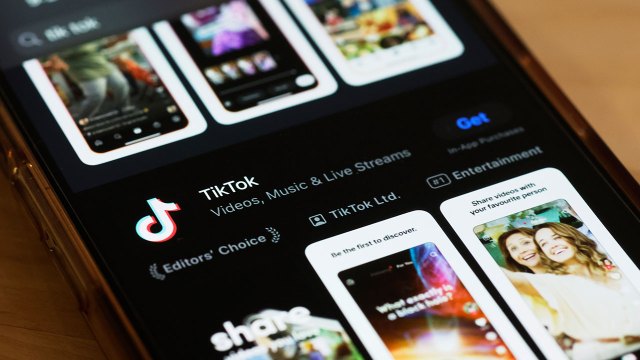
This study seeks to better understand the accounts that U.S. adults choose to follow on TikTok. The TikTok user experience happens largely within the site’s For You page, a feed that is “unique and tailored to each specific individual” based on many factors, such as the behavior they display while on the site. The Following page, by contrast, is constructed directly from the contents of accounts the user follows.
However, user interactions with posts from the accounts they follow play a nontrivial role in shaping their For You page. And studying these followed accounts can give us a better understanding on the content that users actively choose to look for on the platform.
To conduct this analysis, we started with a representative sample of U.S. adult TikTok users who gave us a valid account handle (their unique account name preceded by an “@” sign) for research purposes. All of these users are members of the Center’s American Trends Panel (ATP).
For the 664 such users whose profile publicly displays the accounts they follow, we collected a list of all their followed accounts. That produced an initial list of 227,946 unique accounts. We then collected any available profile information for those accounts, such as their display name, bio and the number of followers they have. This collection occurred April 8-16, 2024. We also collected up to five of their most recent posts (if available). This content data collection was conducted June 14-20, 2024.
Using a combination of human coding and machine classification with Large Language Models (LLMs), we then categorized those accounts into categories based on whom the account belongs to and the type of content they post.
For more details on the categories we included in the analysis and how this data collection and classification was conducted, refer to the methodology of this report.
There are a variety of ways to categorize the different types of prominent accounts present on a social media platform. Here are some of the terms and definitions we have adopted for this study:
- Followed accounts – Any TikTok account followed by any given user. The accounts a user follows on TikTok appear in that user’s “Following” list.
- Following page – A content feed on TikTok that consists solely of the content posted by the accounts that a given user follows.
- For You page (FYP) – A content feed on TikTok that is algorithmically curated to each user, based on their interests and behaviors on the platform. The For You page is the default feed that is served to users as they visit the platform. The FYP may include posts from accounts that a given user follows, but it typically contains recommended content from other accounts beyond the user’s following list.
- Influencers and content creators – Used interchangeably to refer to accounts with at least 5,000 followers on TikTok who attained their popularity primarily due to their presence on the internet, especially on social media (often described as “internet-native”), as opposed to those with a significant level of public awareness outside of social media (such as movie stars, professional athletes or politicians).
- Mega influencers and internet celebrities – Refers to influencer or creator accounts with at least 1,000,000 followers on TikTok.
- Mid-tier individual influencers and creators – Refers to influencer or creator accounts that appear to belong to an individual who have between 5,000 to 1,000,000 followers on TikTok.
- Small accounts – Refers to accounts with fewer than 5,000 followers on TikTok. These accounts are typically maintained by individual users as a personal profile on the site, are more often set to private, or often have not posted very much content.
- Entertainers, celebrities and other pop culture personalities – Refers to accounts that appear to belong to traditional celebrities and notable figures from pop culture or the entertainment industry, including movie stars, bands or musicians, professional athletes, comedians and more, who attained their fame primarily outside of social media.
- Journalists, pundits and media outlets – Refers to accounts that belong to professionals in the news media, either the official accounts of specific outlets or shows, or individual journalists, commentators or pundits. For this study, “journalists” are individuals with a current affiliation to a news organization that is listed in their account bio.
- Politicians, public officials and government agencies – Refers to accounts that belong to either government agencies, or individual politicians or officials. For this study, “politicians” are individuals who have ever held elected office or are currently running for elected office.
- Accounts that post about … – Topic labels in this study, such as “news,” “politics” or “pop culture and entertainment,” refer to accounts that were observed mentioning a given topic in their most recent posts as of the content collection period for this study (June 14-20, 2024). Accounts do not need to primarily post about a given topic to receive any of the content topic categorizations used in this study. Any mention is sufficient.
For further discussion of the account type and topic categories used in the study, refer to the report methodology.
A new Pew Research Center analysis of the accounts Americans follow on TikTok highlights the centrality of internet-native content creators, prominent influencers and traditional celebrities on the popular short-form video platform. It also finds that users choose to follow far more accounts that post about pop culture and entertainment than those posting about news or politics.
To conduct this analysis, we surveyed a nationally representative group of U.S. adults who gave us access to their TikTok handles and identified all the accounts those users follow. We then categorized all of those followed accounts based on who they are and what sorts of things they tend to post about. These are some of the main findings:
What types of accounts do U.S. adults follow on TikTok?
Broadly, they follow lots of creators and influencers who have risen to their current level of prominence via social media, as well as traditional celebrities.1 Together, these groups are around half of all the accounts followed by U.S. adults on the platform and the vast majority of the 100 accounts followed by the largest share of U.S. adults.
But they follow very few politicians, civic actors or traditional media outlets and journalists. Each of these groups makes up less than half of 1% of all the accounts we examined. And the typical U.S. adult on TikTok follows no accounts in each of these categories.
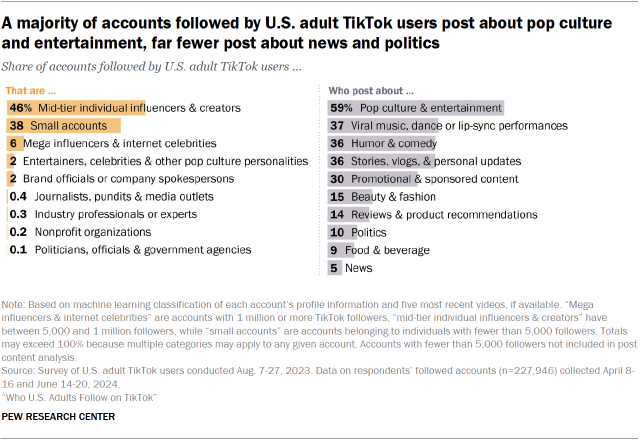
Americans on TikTok also follow a large number of accounts that do not fit cleanly in any of these categories. These are largely personal accounts that have relatively few followers and post infrequently, if ever. Some 38% of all accounts followed by U.S. adults on the site fit this description.
In many ways, these findings mirror how TikTok users describe their own motivations for using the platform when surveyed. A Center survey of adult internet users conducted earlier this year found that nearly half of TikTok users report that they see political content on the site, but that’s not the primary reason most users say they are there. And 95% of U.S. adult TikTok users say they use it because it’s entertaining, while 41% say they use it to get news and 36% use it to keep up with politics.
What do the accounts followed by U.S. adult TikTok users post about?
Lots of entertainment and pop culture, and relatively little political content or traditional news. Content related to entertainment and pop culture appeared in 59% of these accounts during the time period we studied.
Other common topics include humor and comedy, personal vlogs, and viral music or dance clips – each of these three content types appeared in around a third of all the accounts we examined.
Meanwhile, a growing share of TikTok users say they are getting news on their feeds, and nearly half say they see at least some political content there. But this content is relatively rare in the accounts they specifically choose to follow. Around one-in-ten of these followed accounts post content related to political or social issues, and just 5% discuss news events, current events or breaking news.
Accounts that discuss news and politics tend to mix these topics with humor, entertainment and other ‘light’ content
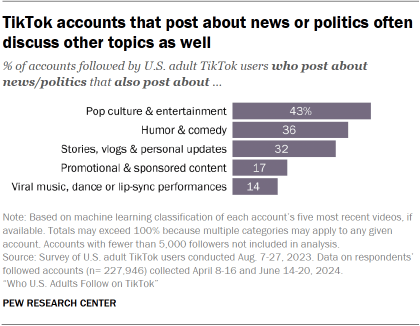
To the extent Americans’ followed accounts discuss politics, it tends to be mixed with other topics. Some 43% of all followed accounts that discussed politics or current events during the study period also discussed entertainment and pop culture. And just over a third also posted humorous content.
There is also a fair amount of blending of politics and commerce: 16% of followed accounts that discussed politics or current events also posted promotional or sponsored content.
In total, some three-quarters of all the accounts that mentioned politics or current events during the study period also mentioned at least one of the other topics we categorized in our analysis.
Discussion of news, politics is less prevalent among the platform’s most-followed accounts
Some 12% of accounts with fewer than 500,000 followers discuss politics and/or news and current events. But that share falls to 7% among accounts with more than 1 million followers.
By contrast, a much larger share of high-follower accounts discuss topics such as humor, entertainment and promotional content.
The typical following list contains a range of account sizes, from niche accounts to those with millions of followers
Around one-fifth of the typical adult’s following list are social media influencers with more than 1 million total followers. At the same time, about 25% of the accounts a typical user follows are small, mostly personal accounts with fewer than 5,000 followers themselves.
On average, TikTok users ages 18 to 34 follow more than three times as many accounts as those 50 and older. They also follow a larger number – and a larger share – of very popular accounts with more than 1 million followers.
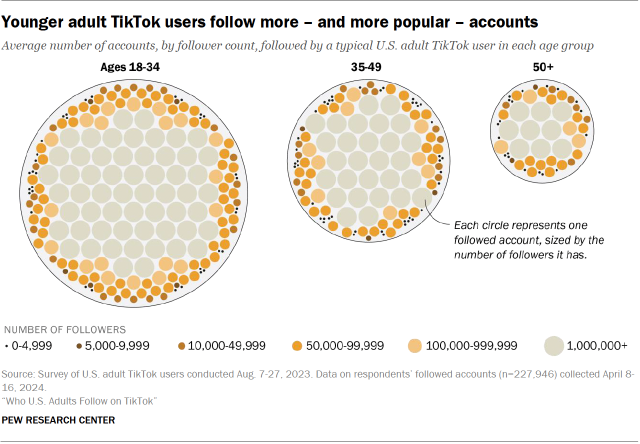
Every user’s following list is largely unique to them
The accounts that Americans follow on TikTok are almost entirely bespoke to each individual user. The 664 TikTok users in this study collectively follow nearly a quarter-million other accounts. Some users follow only a handful of accounts, while others follow thousands.
There is also nearly no overlap in the accounts U.S. adults follow. Just 5% of these accounts are followed by five or more users in the study.
How these findings compare with other social platforms
In 2022, we conducted a similar analysis of the accounts U.S. adults follow on the social media platform X (then known as Twitter). These two analyses highlight one key difference in following behaviors on each site.
Specifically, the accounts followed by the largest share of U.S. adults on Twitter contained a much higher proportion of media outlets or journalists, governmental or political figures, or policy/advocacy groups than is true on TikTok today. These accounts are nearly nonexistent among the most-followed accounts on TikTok at the time of our new study.
Even so, accounts related to politics and the news media made up a very small share of all the accounts followed by U.S. adults on Twitter. And around one-quarter of all followed accounts on Twitter at the time were related to the world of entertainment writ large.
And on Twitter as on TikTok, a sizable share of followed accounts – many of which had few followers or posts – simply did not fall into any of the categories in our analysis.
A profile of U.S. adults’ following behavior on TikTok
The 664 U.S. adult TikTok users whose following lists could be observed for this study collectively follow around a quarter-million unique accounts. The median user follows 144 other accounts on the platform, although this number varies greatly from person to person: 10% of users follow fewer than five accounts, while another 10% follow more than a thousand. And younger users tend to follow a larger number of accounts than their older counterparts.
There is also very little overlap in the accounts that U.S. adults follow on the platform. The majority of these accounts – roughly 150,000 of them – are followed by just a single user in our sample. And only around 10,600 – or 5% of the total – are followed by more than five users. If we were to randomly select any two users from the study, on average they would have fewer than two followed accounts in common with each other.
Around four-in-ten of these followed accounts have fewer than 5,000 followers themselves, while 6% have a million followers or more. But these so-called “mega influencers” make up around one-fifth (22%) of the accounts that a typical American adult on the site follows.
Smaller accounts make up an especially prominent share of the accounts followed by older TikTok users. Just 15% of the accounts followed by the average 18- to 34-year-old have fewer than 5,000 followers, but that share rises to around 30% for users 35 and older.
The types of accounts U.S. adult TikTok users follow
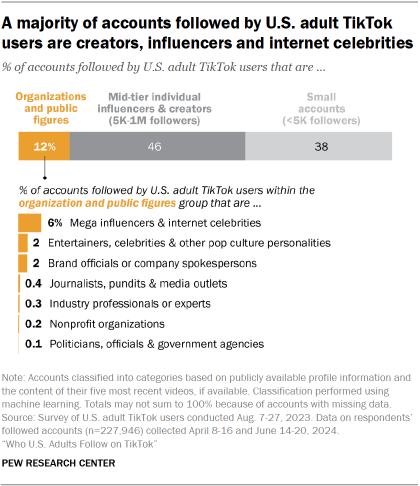
After collecting all the accounts followed by this representative group of users, we first wanted to see what types of accounts they are.
By examining their site bios and other available information, we found that:
- 38% of these accounts are small accounts (fewer than 5,000 followers) that are largely maintained by individuals as a personal profile on the site.
- 46% belong to individual creators or influencers who have built up a larger audience, but who are not publicly prominent outside of their specific social media niche.
- 12% belong to organizations, highly prominent influencers with more than 1 million followers or individuals with a significant level of public prominence outside social media.
The 12% of accounts that belong to organizations and public figures is itself made up of many different subgroups. Nearly half of these accounts are internet celebrities and mega-influencers with more than a million TikTok followers. That works out to roughly 6% of all the accounts followed by U.S. adults on the platform.
Around one-in-five accounts in this group belong to consumer products or commercial brands. That works out to 2% of all followed accounts. And a similar share are traditional celebrities (such as movie stars or individual athletes) or celebrity groups (such as bands or comedy troupes).
Very few of these accounts belong to people or entities directly related to politics, government or the news media. Each of these groups make up less than half of 1% of all accounts followed by U.S. adult TikTok users. And the typical U.S. adult on the platform follows no professional journalists or political commentators, news organizations, politicians or candidates, or government agencies.
What the accounts followed by U.S. adult TikTok users post about
In addition to classifying what the accounts followed by U.S. adult TikTok users are, we also wanted to know what sorts of topics they post about. To do this, we collected each account’s five most recent videos (data collection conducted June 14-20, 2024) and used machine learning to identify several common topical themes and content types present in these videos.2
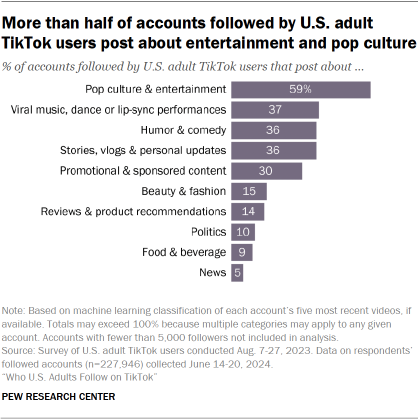
As noted above, 38% of the accounts followed by U.S. adults on TikTok have fewer than 5,000 followers. We excluded these accounts from this part of the analysis, for several reasons. First, many of these accounts simply have very little content to examine. More than half have posted fewer than 20 videos over the life of the account, and a quarter have never posted. Around 10% of these smaller accounts are set to private, which prevented us from accessing their videos at all (just 2% of followed accounts with 5,000 or more followers are private).
The most common topics posted by these accounts are related to entertainment and popular culture. Over half (59%) of followed accounts were observed posting pop culture or entertainment-related material. Other common topics are highlights of the short-form vertical video format native to TikTok. Some 36% of accounts were observed posting humorous or comedic content, such as jokes, skits and parody videos. And 37% posted made-for-social media music, dance or lip-sync performances.
Focus on news and politics content
Content related to news and politics is quite rare by comparison. Only 10% of these followed accounts were observed posting about politics during the study period, and just 5% posted content directly related to news or current events.
And as rare as this content is in general, it is even rarer among the most popular accounts. Around 12% of accounts with fewer than 500,000 followers could be observed posting about news and/or politics. For accounts between 500,000 and 1 million followers, that share is just 9%, and above 1 million followers it drops even further to 7% of accounts.
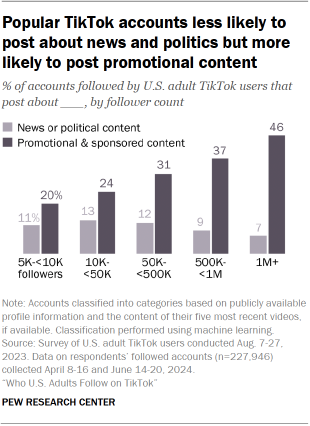
By contrast, a much larger share of popular accounts post promotional content (including self-promotion). Around one-in-five accounts with 5,000 to 10,000 followers were observed posting promotional content of some kind. But that share increased to 46% for accounts with a million followers or more.
The accounts that do post about news or politics typically do so in the context of other types of content. Three-quarters of accounts that were observed posting about news or politics also posted content from one or more of the other category types we looked at – often humor and/or pop culture.
And although older TikTok users tend to follow fewer accounts than younger users do, news and politics makes up a slightly larger share of the following lists of older users. For users ages 50 and older, the average share of followed accounts observed posting about news or politics is 10%, compared with 7% for users 18 to 34. By contrast, the share of followed accounts that post about pop culture and entertainment is lower among older users than younger ones.
Focus on the 100 accounts followed by the largest share of U.S. adults
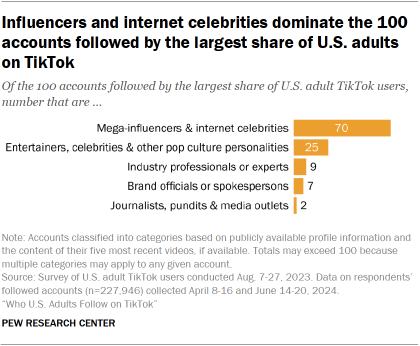
The prominence of influencers and entertainers in Americans’ following lists is even more apparent if we focus on the 100 individual accounts followed by the largest share of U.S. adults.
Seventy of these 100 accounts belong to internet celebrities or influencers who rose to prominence by way of social media. The second largest group – 25 of the top 100 – belong to “traditional” celebrities, such as actor Will Smith, comedian Kevin Hart and TV personality Gordon Ramsey.
And as was true of Americans’ followed accounts more broadly, traditional journalistic enterprises are a rarity in this list of 100 as well. Just two “news organization” accounts are present on this list: ESPN and The Daily Show.
These accounts also mirror the broader universe when it comes to the topics they post about. Two-thirds of the most followed accounts posted humor or comedy content, while more than half of them posted personal updates or vlogs. And more than half of them posted content that directly endorsed a brand or product.
Meanwhile, just nine of the 100 top accounts mentioned news and political topics on their content. And most of these were from outside the world of politics or traditional news, with one such example being music artist Lizzo.




